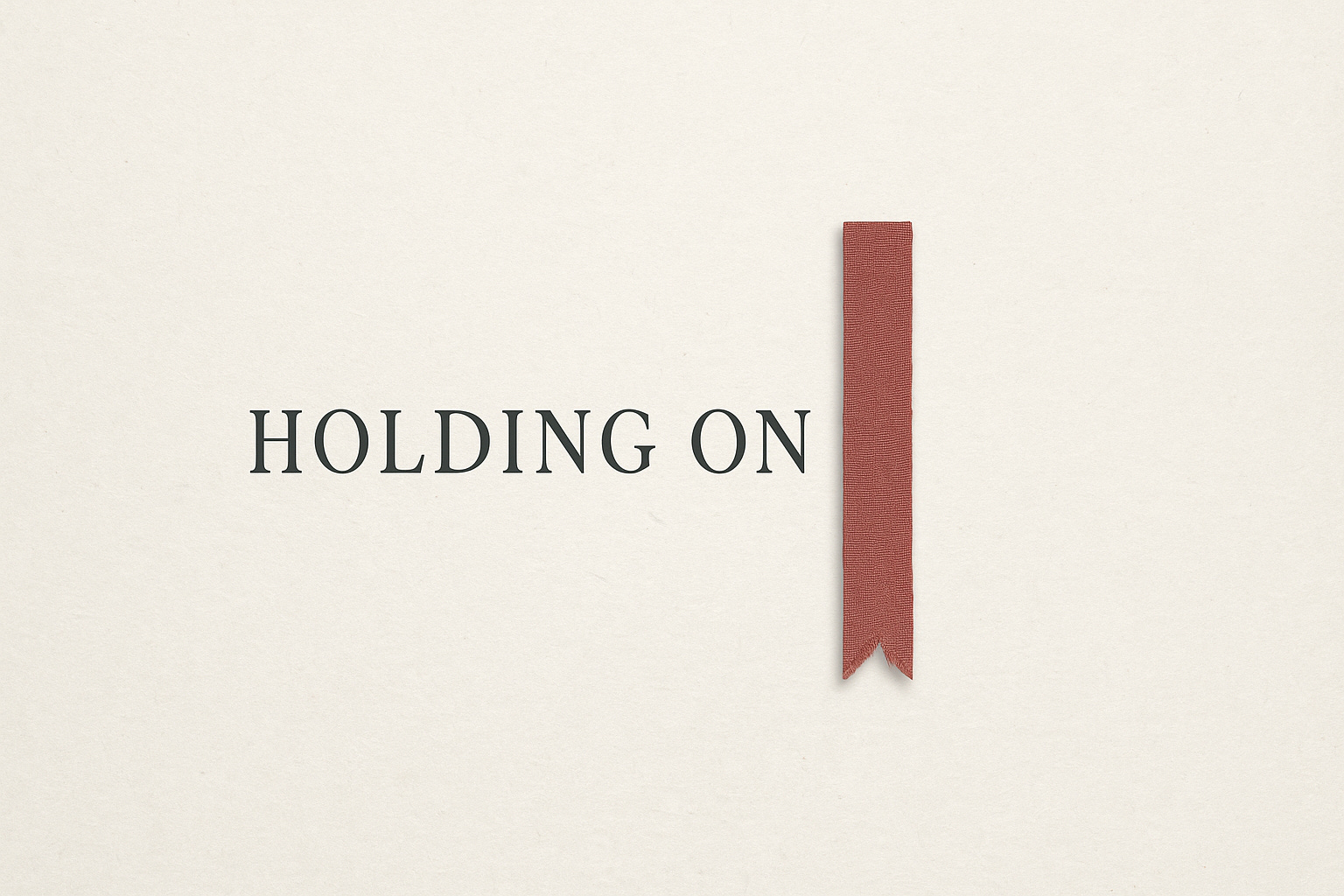Welcome back to Holding On.
Last time, we followed David as he hovered at the edges—of grief, of family, of himself. A son in a borrowed suit, a brother with nothing to offer but guilt and silence. But something shifted.
He stepped forward.
Not with certainty, but with presence.
Now, we return to the hospice.
To a quiet room and a quieter man. To a daughter who keeps moving and a son who’s trying not to disappear. To the weight of unfinished things—and the question of whether love, once withheld, can still be offered in time.
This chapter doesn’t give easy answers.
But it holds space for the trying.
Still holding on. Even when the hands tremble.
Chapter Eleven
The hospice room felt altered, but not empty. Ralph’s bed stood alone, surrounded by family photos, children’s drawings, and cards now dulled at the edges. Each item was arranged with quiet care, as if order might warm the edges of the emptiness. But absence had a shape, and it reached into every corner.
David paused in the doorway, shoulders drawn tight, the air pressing against him. His thoughts came in fragments—none he wanted to catch. He stepped forward and rested a hand on his father’s arm. Cool skin. Fragile. Still. Only then did he notice the faint rise and fall of Ralph’s chest—so slight it might not have been there at all.
By the window, Rachel sat with her planner open, her pen moving in practiced strokes. She didn’t look up. David wondered what she was writing—medication notes, questions for the doctor, or just a list to stay upright. She paused often, the pen hovering midair, before letting it land. He envied her precision, her ability to do something with the ache.
His footsteps broke the silence, and Rachel glanced over.
“He’s comfortable,” she said, soft but steady.
David nodded. The word felt hollow now. Comfortable seemed less like a truth and more like a kindness no one dared unpack.
A quiet knock. Dr. Patel entered, calm and deliberate, adjusting the monitors.
“Good morning, Ralph,” she said gently, as though he might answer.
Rachel straightened. Her questions came sharp and focused—doses, timings, expectations. Her grip on the pen had turned white. David let her lead. He always had.
Dr. Patel turned to them. “If you’re ready, we can speak in my office.”
Rachel closed her planner with care. “We’ll be there.”
She lingered by the window. David stayed at the bedside.
“He looks… peaceful,” he said, his voice barely above a whisper.
Rachel met his eyes. “He does,” she said. “And that’s what matters.”
They stood without tension. Not reconciled—but not at odds. Rachel tucked the planner under her arm.
“Let’s go.”
David followed. The silence between them held something gentler now. Not resolution. Recognition.
Dr. Patel’s office was too bright. Fluorescent light bounced off white walls. Clean. Indifferent.
Rachel sat first, spine straight, fingers locked tight. David followed, slower, settling beside her. The silence held all they hadn’t said.
Dr. Patel began—hydration, pain relief, daily checks. Rachel leaned in, her pen poised. Each question cut cleanly through the quiet. David stared at his hands. Thought of Ralph’s fingers beneath the blanket. Curled his own. Guilt rising before he could name it.
“So… how often will he be getting pain meds?” he asked. Louder than he meant to.
Dr. Patel gave him a kind look. “We covered that earlier. Ralph is on a continuous infusion.”
Rachel’s expression shifted. “We already talked about that,” she said. Clipped. Her pen resumed its work.
“Is there anything else we should prepare for?”
David sank deeper into the chair. He wanted to say something else. To matter. But the words caught. And so he sat. Letting her carry it.
Rachel faltered. Just barely.
“How much time do we have left?” she asked, voice smaller now.
Dr. Patel paused. “It’s difficult to say. Days. A week, maybe. We’ll keep him comfortable.”
Rachel nodded once and closed her planner. David saw the tremor in her hand before the pen disappeared. It passed quickly. But it was there. And for once, she looked almost as lost as he felt.
Rain hit the windshield in broken rhythms as David pulled into his driveway. He didn’t move. Hands tight on the wheel. Hospice. Rachel. Dad. All of it swirled—unsettled and sharp.
He shoved the door open. Cold air struck him full-on. Rain soaked his shirt in seconds. A loose stone near the curb caught his eye. He kicked it. Hard. It clattered across the street.
Another. Then another. Each one sharper. The ache in his chest rising, shapeless.
He kicked the pavement, slipped. Caught himself. Pain bit into his ankle. He didn’t care.
His breath came hard, short. Rain streamed down his face. He closed his eyes.
Why wasn’t I enough?
Not for Rachel. Not for Dad. Not for Mum.
A noise escaped him—half sob, half groan. It startled him. It sounded like it belonged to someone else.
The tears came. He let them. Didn’t hide them. Didn’t fight them.
The knot in his chest didn’t loosen. But something in him shifted. He thought of Rachel. Not angry—just tired. He thought of Ralph’s hand, weak but still reaching. And of the ladder leaning against the shed back at his Dad’s. Still unfinished. Still waiting.
He couldn’t leave it all to Rachel. Not again.
David straightened. Breath shaky, but steadier. The rain had soaked through. The cold was finding his bones.
He turned toward the house, his steps deliberate now.
The stones could stay.
There were other things to fix.
If this chapter resonates...
Subscribe to follow the story week by week, or share it with someone who understands the quiet ache of holding on.


